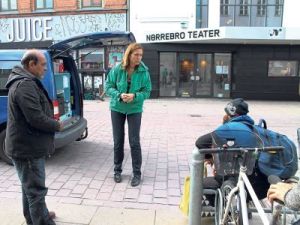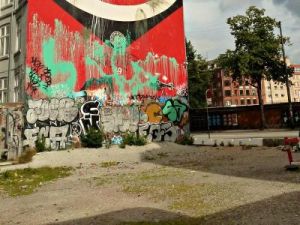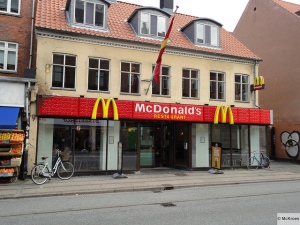Today’s country is Denmark:
From the Copenhagen Post: The citizens of Copenhagen are concerned about the number of foreign homeless on their streets. With winter coming, there is concern for the well being of the homeless and the City Council of Copenhagen is asking Parliament to change the current laws.
Current laws permit non-residents from receiving social services or sleeping in homeless shelters, but with winter approaching the council’s Social Affairs Committee is now calling for the social affairs minister, Annette Vilhelmsen (Socialistisk Folkeparti), to allow councils to set up so-called transit rooms for them in order to give them shelter as they prepare to leave the country.

Some organisations, such as Project Udenfor (pictured) do help foreign homeless, but they may not use state funds to do so (Photo: Sol Marinozzi Bjørck
The City Council moved this week to put pressure on the government to establish temporary lodging for foreign homeless who are not entitled to social services.
It is an ethical dilemma facing the Danes, as they struggle with the unemployed migrants.
Freedom of movement regulations allow these Europeans to come to Denmark legally, but as soon as they lose their job, or if they can’t support themselves, they lose access to social benefits, their residence becomes illegal and they become unwelcome at shelters.
Most of the time, the shelters aren’t even allowed to let them stay the night.
Bibi Agger is the deputy manager of Projekt Udenfor, another of the groups seeking to change the current law. Her organisation works with the most vulnerable homeless – a group she says includes 20 percent foreigners.
“We find ourselves in an ethical dilemma. What we see on the streets is an unsustainable and undignified situation that calls for political action,” she said. “We have to work to improve living conditions for homeless migrants in Denmark. Anything else would be shameful.”
—–
Denmark may be facing a similar problem as the United States when it comes to foreign languages. The Danes are prejudicial about speaking Danish, and thus some of the international workers running corporations find the experience isolating and therefore Denmark loses quality workers because of it.
“Language at the business and political level is something that is quite restrictive for expats and people who are trying to give back to the business community,” Stephen Shillington, the vice president of McDonald’s Nordic and the managing director of McDonald’s Denmark, told The Copenhagen Post. “That unfortunately makes foreigners feel more isolated.”
A native Australian, Shillington relocated to Denmark with his family in 2010 after working for McDonald’s in his home country. He said he viewed the move as an opportunity to develop professionally and come to understand another culture, but that certain aspects of the transition have occasionally made things challenging in the professional world.
“I’ve been invited to many forums with politicians and it’s very difficult because if I attend, they speak Danish until I speak, and then everyone speaks English. When I’m finished, they go back to Danish,” he explained. “It’s very difficult to get ingrained in the conversation; it’s difficult to keep up. You do feel a bit isolated.”

A native Australian, Stephen Shillington has worked as the head of McDonald’s Denmark since 2010 (Photo: McDonald’s Denmark)
Shillington noted that he has been prevented from interacting with journalists on occasion because they insist on speaking Danish. In addition to the language barrier, he pointed to the nation’s high tax levels and immigration policies as potential deterrents for international employees.
“There are a couple of things that are restrictive toward attracting foreign talent, like making sure we have an attractive expat tax gain,” he said. “I know we have one and it finishes after a number of years, but that means that the talent built up in the country then leaves.”
“The government bureaucracy – the whole process of getting a residence permit and then having it renewed every three years – is quite tedious,” he continued. “I’ve got a family with three children so for my wife and me, it’s basically a full day out of the calendar spent at the Immigration Service. And a lot of work goes into preparing the paperwork before you even go into the office.”
—
When we think of Denmark, what do we think of? Surely we don’t think of anarchists but that’s because we rarely hear much about Denmark.

The plot of land remains empty following the eviction and demolition of Jagtvej 69 in 2007 (Photo: flickr / aka Jens Rost)
in 2007, heavily-armed police stormed and evicted the residents of the squatted building Ungdomshuset, sparking riots that lead to the arrests of over 700 people and damage amounting to at least 14 million kroner. Five days later the house at Jagtvej 69 was demolished. The land on which it stood still stands bare, as developers contemplate how to use the empty plot without falling victim to reprisals.
Since the early 1980s, Ungdomshuset (the ‘youth house’) was the site of a bustling community of art, music and politics related to the anarchist scene. The often uncompromising nature of its residents, the Ungerne (the ‘youths’), polarised public opinion. Their reputation was not helped after a group of people with ties to Ungdomshuset confronted Pia Kjærsgaard, leader of the anti-immigration Dansk Folkeparti party, on Nørrebrogade in 1998, forcing her to seek shelter in a bank until the police could escort her away.
After the demolition of Ungdomshuset in March 2007, demonstrations were held every Thursday to demand a new home. In July 2008, the Ungerne were eventually handed the keys to their new building.
The series of events sparked some of the worst riots the city has seen in modern time and resulted in over 700 arrests.
City politicians want to build affordable housing for young people on a contentious plot of land in Copenhagen’s Nørrebro district.
Despite being given a new home on Dortheavej road, the future of Jagtvej 69 is an intensely sensitive subject for Copenhagen’s left-wing groups.
City politicians recognize the sensitivity of the issue, but Sisse Welling (Socialistisk Folkeparti) argued that the empty plot could now be used to address the city’s shortage of affordable housing for young people.
“It’s sad that the plot stands empty as a scar representing bad political decisions,” Welling told Jyllands-Posten. “This way we could give the plot back to the city’s youth.”
